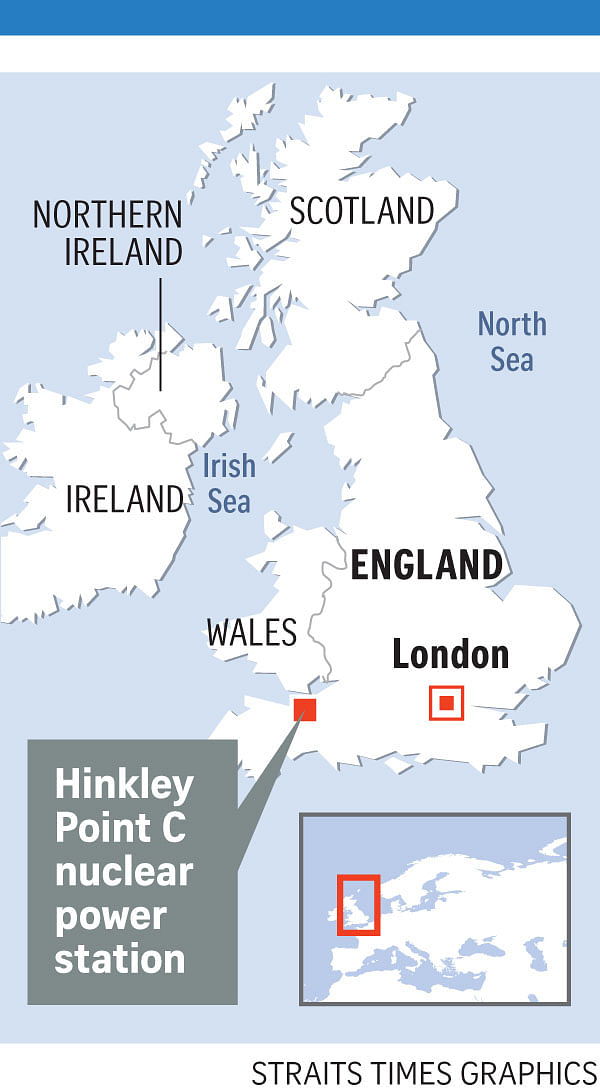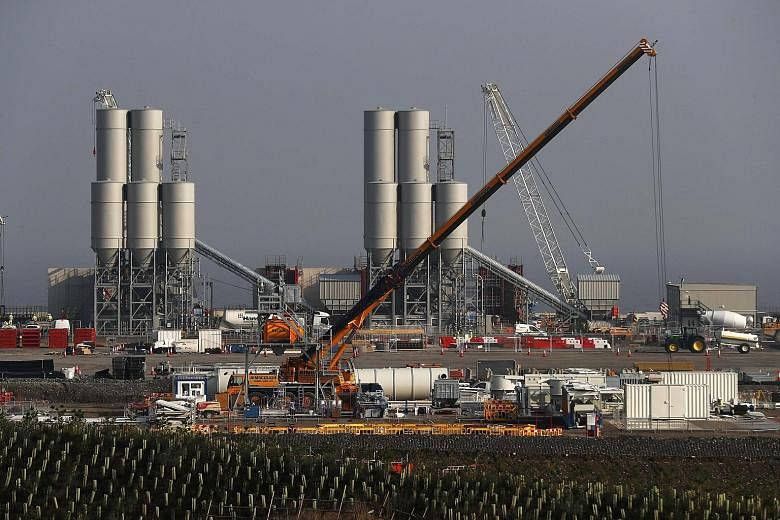LONDON • Britain gave the go-ahead yesterday for an £18 billion (S$32.4 billion) nuclear power plant, ending weeks of uncertainty that strained ties with China and France but also signalling a more cautious approach to foreign investment in critical infrastructure projects.
The government of new Prime Minister Theresa May said it would proceed with the Hinkley Point C project in south-west England, approving French utility firm EDF's plan to build Britain's first new nuclear reactor in decades, backed by US$8 billion (S$11 billion) of Chinese cash.
It also set out a new investment policy designed to give it greater control over future deals when foreign states are involved in buying stakes in "critical infrastructure".
Mrs May, who became Prime Minister after the Brexit vote, stunned investors by putting the nuclear project on hold in July - just hours before a contract was due to be signed - saying that she needed time to assess all aspects of the project, including national security concerns. According to ex-business minister Vince Cable, Mrs May had concerns over the "gung-ho" attitude that her predecessor, Mr David Cameron, took towards courting Chinese investment.
The government said it would be able to stop the sale of EDF's controlling stake before or after completion of the project under new safeguards. EDF said it had agreed with the government to retain control of the project.

Furthermore, "after Hinkley, the British government will take a special share in all future nuclear new-build projects", according to a Department for Business, Energy and Industrial Strategy statement.
EDF, China General Nuclear Power Corporation (CGN) - the project's state-backed Chinese investor - and business lobby groups welcomed the decision to proceed.
"We are very happy the British government has approved the project," CGN said in a statement.
CGN plans to make a number of investments in British nuclear power, including the building and operating of a new nuclear power station with EDF at Bradwell-on-Sea in Essex, south-east England. Bradwell would be a Chinese-led project, using Chinese reactor technology.
Britain has committed to pay a minimum price for the power generated by Hinkley for 35 years.
Critics of the deal said the government should have renegotiated the price, which they say was set too high before oil prices fell, but the statement yesterday said the price had not changed for the energy.
"It is extraordinary that they have not reviewed the price per unit of power," said Mr Barry Gardiner, the opposition Labour Party's energy spokesman.
-
HINKLEY POINT NUCLEAR POWER PLANT
-
The project is expected to cost about £18 billion (S$32.4 billion).
It will generate up to 3.2 gigawatts of electricity, enough to charge 640 million iPhones at once.
The plant will deliver energy at a price of £92.50 per megawatt hour for 35 years. Consumers will effectively pay the difference between that and the market price.
Construction work on the project will create 25,000 jobs. At its peak, 5,600 people will work on site, while the finished plant will employ 900 people.
State-owned China General Nuclear Power Corp will put up 33.5 per cent of the cost of building Hinkley. French utility company EDF will contribute the remaining 66.5 per cent.
The reactors will cover up to 7 per cent of Britain's electricity needs while helping the government meet its emissions targets to combat climate change.
REUTERS, AGENCE FRANCE-PRESSE
Environmental group Greenpeace has also attacked the decision. "Today's decision hasn't been made on the cold, hard facts that show Hinkley will not deliver competitively priced, low-carbon energy any time soon. Instead it seems that Hinkley became too big to fail," said Mr John Sauven, executive director of Greenpeace UK.
The French and Chinese governments both hailed the project's approval. "This marks a major milestone in Franco-British industrial and energy cooperation," French Finance Minister Michel Sapin said in a statement.
China's Foreign Ministry said in a statement that it hoped that with the hard work of China, Britain and France, Hinkley Point and other subsequent nuclear cooperation projects could proceed smoothly as fast as possible.
REUTERS, BLOOMBERG, XINHUA

